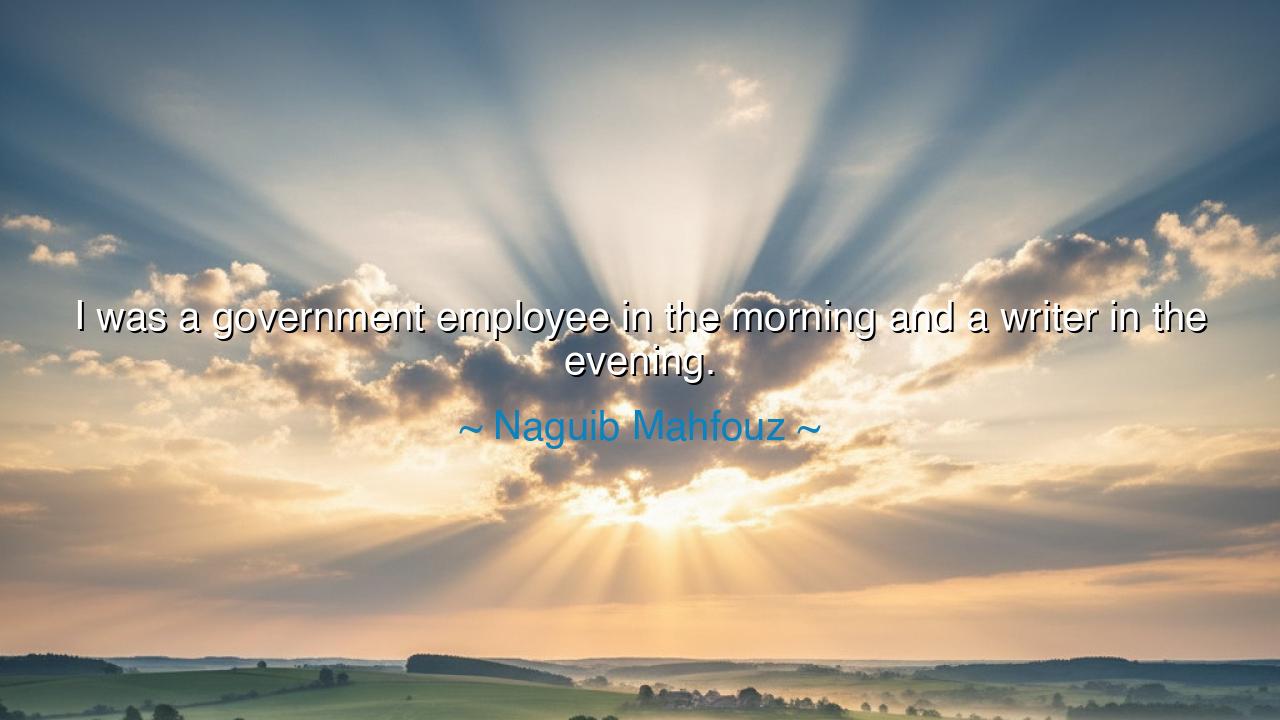
I was a government employee in the morning and a writer in the






The words of Naguib Mahfouz, the sage of Cairo and Nobel laureate of letters, ring like the chime of two worlds: “I was a government employee in the morning and a writer in the evening.” In this brief confession lies the secret of countless lives: the balance between duty and dream, between labor that sustains the body and labor that nourishes the soul. Mahfouz, born into the ordered streets of Egypt, knew that life does not always grant the freedom to live entirely in the realm of imagination. Yet he also knew that one must never surrender the call of the spirit. Thus he became two men in one: servant of the state by day, servant of the muses by night.
The ancients taught that man is divided: body and soul, necessity and desire, earth and heaven. By day, Mahfouz bent to the yoke of the government, attending to the duties that life demanded. But as the sun fell and the world softened into evening, he returned to his truest calling. There, at his desk, he was no longer a bureaucrat, but a writer, a creator of worlds, a voice for the people of Cairo. This dual existence was not a weakness but a triumph, for it shows us that the soul may blaze even within the confines of obligation.
Recall the story of Marcus Aurelius, emperor of Rome. By daylight he bore the burden of empire, hearing petitions, issuing decrees, leading armies. Yet in the stillness of night he penned his Meditations, words not meant for empire, but for eternity. Like Mahfouz, Aurelius lived two lives: one of public duty and one of private truth. In both men we see the eternal balance: the world may claim the day, but the soul may still claim the night.
Mahfouz’s words remind us that greatness often blooms in the margins of time. His novels—The Cairo Trilogy, Children of Gebelawi, and more—were not written in the spacious leisure of idleness, but in the narrow hours stolen from fatigue. This is the mark of devotion: to labor first for necessity, then to labor again for the heart’s desire. Many think that dreams must wait for freedom, but Mahfouz shows us that freedom begins not when the chains fall away, but when the soul refuses to be silenced.
The lesson is clear and urgent: do not wait for perfect conditions to pursue your calling. The world will always demand your hours, your effort, your service. Yet there remain fragments of the day—mornings, evenings, fleeting intervals—that you can consecrate to your higher work. If you desire to write, then write after the day’s labor. If you long to paint, then paint in the quiet of the dawn. If you wish to build, then build with the time others waste. The path of Mahfouz shows us that greatness is carved not by abundance of hours, but by fidelity to the hours one has.
Therefore, let the weary take heart. Your day may belong to the marketplace, the office, the endless tasks of survival. But your evening, your quiet spaces, can belong to eternity. Guard them fiercely. Use them well. Within those stolen hours lies the seed of immortality. Mahfouz did not abandon his post, nor did he abandon his dream. He lived both, and from that duality rose a voice that speaks across nations and centuries.
So take this wisdom as your own: Be diligent in your duty, but steadfast in your art. Give to the world what it requires, but never forget to give to your soul what it desires. For in the end, men are not remembered for their titles or their wages, but for the truths they dared to create when the day was done. Live, then, as Mahfouz lived: by day a worker, by night a dreamer, and always, always, a servant of the eternal flame within.






AAdministratorAdministrator
Welcome, honored guests. Please leave a comment, we will respond soon